-
Water infrastructure budgets to see massive cuts in 2012
Next year water infrastructure projects and programs are expected to see massive budget cuts as President Obama has proposed slashing infrastructure spending at the Environmental Protection Agency (EPA) and the U.S. Army Corps of Engineers; the Drinking Water State Revolving Fund (SRF) will see nearly $400 million cuts and the Clean Water SRF will be cut nearly $600 million; according to Lisa Jackson, the EPA administrator, these cuts in SRF budgets reflect a return to a more “sustainable level”; states worry that cuts will make it difficult to fund future infrastructure upgrades; reports have shown that the United States faces a $500 billion shortfall for water infrastructure funding over the next twenty years
-
-
Safeguarding the private and public sector from insider threats
While most discussion of insider threats have focused on cyber security concerns, a recent panel at the Government Security Convention and Expo in Washington, D.C. discussed the potential physical threats posed by insiders;businesses, government agencies, and other organizations are vulnerable to a host of threats from insiders including corporate espionage, workplace violence, and the loss of sensitive materials or data; panelists discussed efforts to reform the Federal Protection Services, which is charged with securing roughly 9,000 federal facilities, the latest technologies in detecting cell phones in secure areas, new body scanners, as well as the legality of stepped up security measures
-
-
Kentucky releases homeland security terrorist reporting app

Kentucky’s Office of Homeland Security (KOHS) recently released an iPhone app designed to allow people to anonymously report any suspicious activity they see; the app, called, Eyes and Ears on Kentucky, captures tips in real-time and is capable of providing additional information using the iPhone’s camera and GPS features; the app comes as part of the broader national DHS “See Something Say Something” campaign which will gather tips from across the nation and allow local, state, and federal law enforcement officials to sift through reports of any suspicious activity
-
-
ICE opens office in northern Michigan
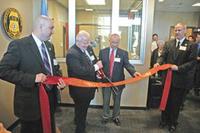
The U.S. Immigration and Enforcement agency (ICE) recently opened a permanent facility in northern Michigan; the new ICE office will provide work space for agents conducting enforcement removal operations (ERO) and homeland security investigations (HSI); the 10,000 square-foot facility will include an evidence-processing room, modern offices, and a short-term holding cell; the facility will help ICE agents secure America’s northern border;a recent Government Accountability Report found that only thirty-two miles of the nearly 4,000 mile long northern border had “an acceptable level of security”
-
-
Security cameras to be installed at all DC metro stops

In response to a rash of crimes near Washington, D.C.’s metro stations, local authorities recently announced plans to install security cameras outside all eight-six train stations; the Metro Board’s Safety and Security Committee released a report several weeks ago that found that last year the number of thefts and robberies had hit five-year highs; the Board has purchased 153 color cameras thanks to a $2.8 million DHS grant; with violent crimes around the Metro on the rise, more residents have begun to push for the installation of security cameras
-
-
Analysis: Support for, opposition to, Gaddafi is tribal in nature
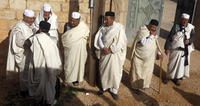
The biggest danger to Col. Gaddafi is not the disorganized rebel forces, not even the destruction of the Libyan air force. Rather, the one thing that will bring him down is the loss of support from the tribal coalition that has kept him in power for four decades; the key to the success of the coalition in its efforts to persuade Gaddafi to abdicate is thus the coalition’s ability to persuade the tribes which have supported Gaddafi so far that they are betting on a losing horse; the tribal support for Gaddafi has thus far held, but high-level defections by members of historically supportive tribe — for example, Libyan Foreign Minister Moussa Koussa and Ali Abdel-Salam al-Treki, former foreign minister who had been representing Libya at the U.N.— may be an indication that the Gaddafi’s tribal coalition is fraying
-
-
Eyeless in Libya -- and a Swiftian border security solution
Everyone knows what the Libyan rebels are against — Gaddafi — but there is no way tell what they are for; this lack of information is not good; first, the United States and its allies may be pushing for the replacement of the devil we know with the devil we do not know; this is akin to giving Michael Phelps a three body length advantage at a swim meet: not a good idea; second, the lack of knowledge about the rebels is like a Rorschach test: outsiders look at them and see what they want to see; Jonathan Swift suggests that impoverished Irish might ease their economic troubles by selling their children as food for rich gentlemen and ladies; should we consider a Swiftian solution to problem of securing the U.S.-Mexico border?
-
-
Senate holds Muslim civil rights hearings
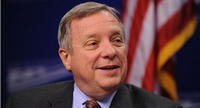
Senator Dick Durbin (D - Illinois) recently presided over a Senate hearing exploring Muslim civil rights; Durbin said that the goal of the hearings was to show that most Muslim Americans “are patriotic, law abiding people who simply want to live their life as we do”; witnesses said that anti-Muslim sentiment is on the rise; from 2008 to 2009 25 percent of all complaints to the Equal Employment Opportunity Commission were Muslim bias-based; Senator Jon Kyl (R - Arizona) said he was perplexed by the need to hold specific hearings on Muslim civil rights citing the fact that most religious hate crimes in the United states are committed against Jewish people
-
-
Coalition faces unappealing choices in Libya
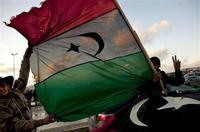
The Obama foreign policy and national security team has concluded that the poorly equipped opposition is probably incapable of prevailing without decisive Western intervention — either an all-out U.S.-led military assault on regime forces or a decision to arm the rebels; even though an invasion of Libya will be smaller in scope than the invasion of Iraq, the United States and the Europeans have no stomach for it, and the coalition’s Muslim members will not support it; a decision fully to coordinate Western air power with rebel ground movements would place Washington openly on the side of the rebels, whose goals and makeup are murky and whose chances of winning — even with more air support — are questionable
-
-
TSA fired an agent for being a witch
TSA fires a security screener at New York’s Albany International Airport for being a witch; the screener, who practices Wicca, was accused by a fellow worker of casting a spell on her (the fellow worker’s) car’s heater so it would not work; when the screener refused to participate in mediation to dispel myths about Wicca, she was terminated
-
-
Special rural training for NM park rangers
New Mexico State Park Rangers are currently receiving specialized training from the state’s Department of Homeland Security and Emergency Management; the training is designed to prepare first responders to conduct operations in rural terrain. In particular the program will address the needs of officers working along the state’s southern border with Mexico and in rural areas
-
-
$200,000 grant for upstate N.Y. fire department
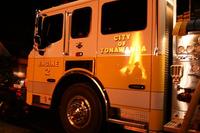
Last week the city of Tonawanda in western New York received nearly $200,000 from DHS to purchase new firefighting equipment; the money will be used to purchase harnesses, ropes, victim removal devices, enhanced air supply equipment, and a new communications system; funding comes from the DHS Assistance to Firefighters Grant Program; the grant comes at a critical time as the city is struggling with its budget; several local fire departments nearby also received grants last month including those in Rochester, Youngstown, and Ridge-Culver
-
-
Relying on technology to prevent another WikiLeaks
After the WikiLeaks scandal leaked hundreds of thousands of classified documents from military networks, the U.S Intelligence Community (IC) is grappling to find the right balance between information sharing and protection; IC’s information sharing executive says the government is relying on technological solutions to protect data while also sharing information across intelligence agencies; technological solutions will be implemented in a two-pronged approach over the next two years; implementation of these additional security measures is on schedule and the IC’s chief information officer expects to be able to assign security certificates to IC personnel by the first quarter of FY2012
-
-
Half of EPA's radiation warning system in California defective
The defective sensors are part of EPA’s RadNet detection system which was created to provide an active warning system that would alert scientists and public health officials of any elevated levels of radiation so they can warn the public or take other protective measures; half of California’s twelve sensors have been sending data with “anomalies” to the EPA’s main laboratory; the faulty data results in delays of up to several hours; officials say that the sensors are fully functional and that the delays are a result of “glitches” in satellite transmissions; there are several other radiation sensors in the United States operated by local, state, and federal agencies
-
-
Washington nuclear sensors capable of detecting faintest amounts of radiation
The radiation detectors developed by the Pacific Northwest National Laboratory (PNNL) in Washington are so sensitive that they can detect trace amounts of radioactive material from hundreds of thousands of miles away; far from being a public health concern, the amount of radiation from Japan detected on the west coast of the United States was far less than what individuals receive from natural sources and is testament to the sensors extraordinary sensitivity; officials say that the PNNL’s sensors are a hundred times more sensitive than other radiation sensors; the PNNL facility is capable of picking up the faintest amounts of radioactive elements produced by nuclear reactions from the vast amounts of air particles in the world
-
More headlines
The long view
Factories First: Winning the Drone War Before It Starts
Wars are won by factories before they are won on the battlefield,Martin C. Feldmann writes, noting that the United States lacks the manufacturing depth for the coming drone age. Rectifying this situation “will take far more than procurement tweaks,” Feldmann writes. “It demands a national-level, wartime-scale industrial mobilization.”
No Nation Is an Island: The Dangers of Modern U.S. Isolationism
The resurgence of isolationist sentiment in American politics is understandable but misguided. While the desire to refocus on domestic renewal is justified, retreating from the world will not bring the security, prosperity, or sovereignty that its proponents promise. On the contrary, it invites instability, diminishes U.S. influence, and erodes the democratic order the U.S. helped forge.
Fragmented by Design: USAID’s Dismantling and the Future of American Foreign Aid
The Trump administration launched an aggressive restructuring of U.S. foreign aid, effectively dismantling the United States Agency for International Development (USAID). The humanitarian and geopolitical fallout of the demise of USAID includes shuttered clinics, destroyed food aid, and China’s growing influence in the global south. This new era of American soft power will determine how, and whether, the U.S. continues to lead in global development.
Water Wars: A Historic Agreement Between Mexico and US Is Ramping Up Border Tension
As climate change drives rising temperatures and changes in rainfall, Mexico and the US are in the middle of a conflict over water, putting an additional strain on their relationship. Partly due to constant droughts, Mexico has struggled to maintain its water deliveries for much of the last 25 years, deliveries to which it is obligated by a 1944 water-sharing agreement between the two countries.
How Disastrous Was the Trump-Putin Meeting?
In Alaska, Trump got played by Putin. Therefore, Steven Pifer writes, the European leaders and Zelensky have to “diplomatically offer suggestions to walk Trump back from a position that he does not appear to understand would be bad for Ukraine, bad for Europe, and bad for American interests. And they have to do so without setting off an explosion that could disrupt U.S.-Ukrainian and U.S.-European relations—all to the delight of Putin and the Kremlin.”
How Male Grievance Fuels Radicalization and Extremist Violence
Social extremism is evolving in reach and form. While traditional racial supremacy ideologies remain, contemporary movements are now often fueled by something more personal and emotionally resonant: male grievance.
